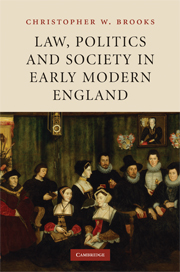Book contents
- Frontmatter
- Contents
- Preface
- Abbreviations and conventions
- 1 English history and the history of English law 1485–1642
- 2 Courts, lawyers and legal thought under the early Tudors
- 3 The initiatives of the crown and the break from Rome
- 4 Political realities and legal discourse in the later sixteenth century
- 5 The politics of jurisdiction I: the liberty of the subject and the ecclesiastical polity 1560 – c. 1610
- 6 The politics of jurisdiction II: multiple kingdoms and questions about royal authority
- 7 The absoluta potestas of a sovereign and the liberty of the subject: law and political controversy in the 1620s
- 8 The degeneration of civil society into a state of war 1629–1642
- 9 Law and ‘community’
- 10 The aristocracy, the gentry and the rule of law
- 11 Economic and tenurial relationships
- 12 The household and its members
- 13 The person, the community and the state
- 14 Conclusion
- Manuscript bibliography
- Index
- References
7 - The absoluta potestas of a sovereign and the liberty of the subject: law and political controversy in the 1620s
Published online by Cambridge University Press: 06 July 2010
- Frontmatter
- Contents
- Preface
- Abbreviations and conventions
- 1 English history and the history of English law 1485–1642
- 2 Courts, lawyers and legal thought under the early Tudors
- 3 The initiatives of the crown and the break from Rome
- 4 Political realities and legal discourse in the later sixteenth century
- 5 The politics of jurisdiction I: the liberty of the subject and the ecclesiastical polity 1560 – c. 1610
- 6 The politics of jurisdiction II: multiple kingdoms and questions about royal authority
- 7 The absoluta potestas of a sovereign and the liberty of the subject: law and political controversy in the 1620s
- 8 The degeneration of civil society into a state of war 1629–1642
- 9 Law and ‘community’
- 10 The aristocracy, the gentry and the rule of law
- 11 Economic and tenurial relationships
- 12 The household and its members
- 13 The person, the community and the state
- 14 Conclusion
- Manuscript bibliography
- Index
- References
Summary
Ireland and the fall of Lord Keeper Williams
England's involvement in conflict against France and Spain, and the ever-increasing influence of the duke of Buckingham in the councils of the early Stuart kings, ultimately made the political circumstances of the 1620s considerably different from those prior to the appointment of Bishop Williams as lord keeper of the great seal in 1621. Yet heated debates in the parliaments of the second half of the decade, as well as a number of well-publicised state trials, put legal questions and, indeed, the common-law judges at the centre of political controversy in a way that matched even the most highly charged episodes of the reign of James VI and I, including the dismissal of Coke. But while the changes in the political climate are absolutely critical to the way in which events unfolded, there were also significant continuities in many of the ideas and issues involved. Indeed, critical questions having to do with the liberty of the subject to criticise policies of the crown, and the power of the crown to respond through the use of imprisonment, had already been ventilated to some degree in the reign of Elizabeth.
Similarly, the parliament of 1621 is known for the dismissal of Bacon from the lord keepership, and misunderstandings between the king and MPs about the best course of policy to follow in order to recover the Palatinate for James's son-in-law, the Elector Frederick V. But from the juridical point of view a no less interesting feature of the early 1620s was the attempt by the government to investigate and reform conditions in Ireland.
- Type
- Chapter
- Information
- Law, Politics and Society in Early Modern England , pp. 162 - 189Publisher: Cambridge University PressPrint publication year: 2009

